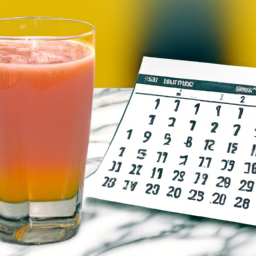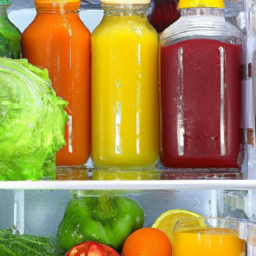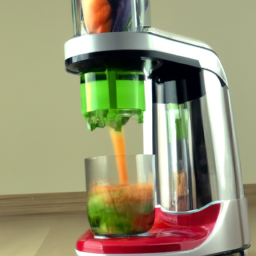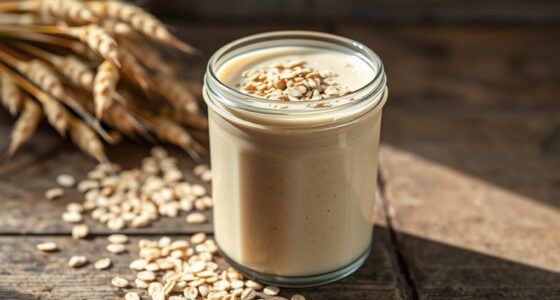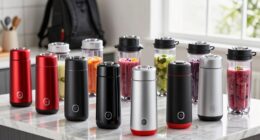Being a juice enthusiast, I have always wondered about the shelf life of freshly squeezed juice. I often make a large batch to last me a few days, but I am curious about how long it stays fresh and maintains its nutritional value.
I did some research and found that the shelf life of fresh juice varies depending on the type of juice and how it is stored. In this article, I will delve into the science behind the shelf life of fresh juice and provide tips on how to extend its shelf life.
Fresh juice is a popular beverage choice for many because of its nutritional value and refreshing taste. However, the shelf life of fresh juice can be limited due to its perishability. The enzymes and natural bacteria in fresh juice can cause it to spoil quickly if not stored properly.
It’s important to understand the factors that affect the shelf life of fresh juice, such as the type of juice and how it’s made, to ensure that you are consuming safe and fresh juice. In the following sections, we will explore the shelf life of different types of fresh juice and methods to extend their shelf life.
Key Takeaways
- The shelf life of fresh juice varies based on type and storage method, with enzymes and bacteria causing spoilage if not stored properly.
- Preservation techniques like pasteurization or high-pressure processing can extend the shelf life of juice.
- Proper storage and cleaning of equipment can prevent bacteria growth and spoilage, and consuming fresh juice within a few days of making it is recommended for maximum benefits.
- Signs of spoilage include foul odor, unusual taste, slimy or grainy texture, and bacterial growth, and fresh juice should be consumed within 24 hours of making it to prevent spoilage.
Understanding the Shelf Life of Fresh Juice
So, how long can fresh juice actually last? Well, it all depends on a few factors.
One of the most important factors is the preservation technique used to make the juice. If the juice is pasteurized, it can last for up to two weeks in the refrigerator. If it’s made using high-pressure processing, it can last for up to 30 days. However, if the juice isn’t preserved in any way, it’ll only last for a few days.
Another factor that can affect the shelf life of fresh juice is the type of fruit used to make the juice. Some fruits have a longer shelf life than others. For example, apples, pears, and grapes can last for up to two weeks in the refrigerator, while berries and tropical fruits like mangoes and pineapples can only last for a few days.
Therefore, if you want to make juice that’ll last for a longer time, it’s best to use fruits that have a longer shelf life. With that said, let’s dive into the shelf life of orange juice.
Shelf Life of Orange Juice
Hey, you know that orange juice you’ve been savoring? Hate to break it to you, but it’s probably on the brink of turning into a science experiment. The shelf life of orange juice can vary depending on several factors, such as the method of extraction, storage conditions, and whether or not it has been pasteurized. The table below summarizes the shelf life of fresh orange juice based on different storage methods:
| Storage Method | Refrigerated | Freezer |
|---|---|---|
| Unpasteurized | 2-5 days | 8-12 months |
| Pasteurized | 7-10 days | 8-12 months |
As you can see, pasteurized orange juice can last longer than unpasteurized juice, but both have a shorter shelf life when refrigerated compared to when stored in the freezer. However, freezing fresh orange juice can affect its taste and texture, so it is best to consume it within a few days of making it.
There are ways to preserve fresh orange juice to extend its shelf life, such as adding preservatives or storing it in a vacuum-sealed container. However, these methods can affect the nutritional value of the juice and may not be the healthiest option. Consuming fresh orange juice within a few days of making it not only ensures its freshness but also provides the full range of benefits that come with consuming fresh juice, such as a high concentration of vitamins, minerals, and antioxidants. Speaking of fresh juice, let’s move on to the shelf life of apple juice.
Shelf Life of Apple Juice
When it comes to apple juice, proper storage is key to maintaining its quality and preventing spoilage. As someone who enjoys a glass of apple juice with breakfast, I make sure to store it in the refrigerator at all times.
Signs of spoilage include a sour or off taste, cloudiness, and a foul odor.
How to Store Apple Juice
To maintain the freshness of your apple juice, it’s important to store it properly. First of all, it’s important to select the right type of apple for juicing. Apples that are naturally sweet and have a high juice content, such as Honeycrisp or Fuji, are ideal for juicing.
Homemade apple juice can be stored for up to three days in the refrigerator, while store-bought apple juice can last up to two weeks. It’s important to check the expiration date on store-bought apple juice and consume it before the date passes.
When storing apple juice, it’s important to keep it refrigerated at all times. The temperature of the refrigerator should be between 33 and 40°F. Once the bottle of apple juice has been opened, it’s important to consume it within seven days. If you want to keep the apple juice for a longer period of time, you can freeze it. However, be aware that freezing can affect the taste and texture of the apple juice.
When it comes to signs of spoilage, it’s important to check the appearance and smell of the apple juice. If the juice appears cloudy, has a strange odor, or has mold growing inside the bottle, it’s best to discard it.
In the next section, we will discuss more about the signs of spoilage and how to tell if your apple juice has gone bad.
Signs of Spoilage
If you’ve ever opened a bottle of fresh juice that smelled or looked off, you know how important it is to understand the signs of spoilage. One of the common contaminants in fresh juice is bacteria. When juice isn’t properly stored, bacteria can quickly multiply and cause spoilage.
Other factors that promote spoilage include exposure to sunlight, high temperature, and air. To prevent spoilage, it’s important to store fresh juice in a clean, airtight container and refrigerate it immediately after juicing. It’s also recommended to consume the juice within a few days of juicing and avoid leaving it at room temperature for extended periods.
Additionally, keeping the juicing equipment clean and sanitized can help prevent the growth of bacteria in the juice. By taking these steps, you can ensure that your fresh juice stays fresh and safe for consumption.
Moving on to the next section about the shelf life of grapefruit juice, it’s important to note that grapefruit juice, like other fresh juices, can also spoil if not stored properly.
Shelf Life of Grapefruit Juice
Grapefruit juice, like all fresh juices, has a limited shelf life, so it’s best to drink it sooner rather than later, remembering that ‘waste not, want not.’ However, there are ways to extend its shelf life and enjoy its benefits for longer.
Here are four ways to preserve grapefruit juice:
-
Refrigerate it immediately after juicing: Freshly squeezed grapefruit juice should be stored in an airtight container in the refrigerator. This will help slow down the oxidation process and prevent the growth of bacteria.
-
Add lemon juice: Squeezing a few drops of lemon juice into your grapefruit juice can help preserve its freshness and flavor. Lemon juice is a natural preservative that can help prevent spoilage.
-
Freeze it: Grapefruit juice can be frozen for up to three months. To freeze, pour the juice into a freezer-safe container, leaving room for expansion, and seal tightly.
-
Use a vacuum sealer: A vacuum sealer can help remove air from the container, which can slow down the oxidation process and help preserve the freshness of the grapefruit juice.
Now, let’s move on to the shelf life of carrot juice.
Shelf Life of Carrot Juice
Carrot juice is a delicious and nutritious beverage that can quickly spoil if not stored properly. To ensure the juice’s longevity, it is crucial to use proper juicing techniques and store it in the right conditions. Juicing carrots correctly can preserve nutrients and extend the juice’s shelf life.
When it comes to storing carrot juice, it is best to keep it in an airtight container in the fridge. Freshly made carrot juice can last up to 72 hours when refrigerated properly. However, it is vital to note that the juice’s quality starts to decline after 24 hours. To ensure the juice’s freshness, it is best to drink it as soon as possible after juicing. Additionally, storing the juice in a glass container can prevent it from absorbing any plastic smells or flavors, which can impact its taste and quality.
Transitioning to the subsequent section about the shelf life of green juice, it is essential to note that different types of juice have varying shelf lives. While carrot juice can last up to 72 hours, green juice’s shelf life may differ.
Shelf Life of Green Juice
When you make green juice, it’s important to know that its shelf life is like a delicate flower that can quickly wilt if not stored properly. Green juice is rich in nutrients, vitamins, and minerals that are essential for a healthy body. Consuming fresh juice regularly has numerous benefits such as boosting immunity, improving digestion, and providing a natural energy boost.
However, it’s important to consume it as soon as possible after juicing to get the most nutrients. There are ways to preserve green juice for longer periods of time, such as storing it in an airtight container in the refrigerator or freezing it into ice cubes for later use.
However, it’s important to note that the longer you store the juice, the more nutrients it will lose. Therefore, it’s best to consume green juice as fresh as possible to get the full benefits.
In the next section, we will discuss methods to extend the shelf life of fresh juice, so you can enjoy your favorite juice for longer periods of time.
Methods to Extend the Shelf Life of Fresh Juice
To maximize the nutritional benefits of green juice, it’s crucial to know effective methods for extending its shelf life.
One way to do this is by using preservatives. Citric acid, ascorbic acid, and lemon juice are commonly used preservatives in commercial juices. These preservatives prevent the growth of bacteria, yeast, and mold. However, the use of preservatives can alter the taste, texture, and color of the juice. It’s important to read the label carefully before purchasing any juice with preservatives.
Another way to extend the shelf life of fresh juice is through pasteurization. The process involves heating the juice to a specific temperature for a short period of time to destroy any harmful bacteria and microorganisms. This method can increase the shelf life of the juice up to several weeks. However, pasteurization can also affect the nutritional value of the juice. Some vitamins and enzymes may be destroyed during the process.
To maintain the maximum nutritional benefits of fresh juice, it’s recommended to consume it within a few days of preparation.
In the next section, I will discuss some tips for storing fresh juice without using preservatives or pasteurization.
Tips for Storing Fresh Juice
If you want to keep your green juice tasting its best, you’ll need to store it properly. One of the best ways to prevent oxidation is to store your juice in an airtight container. This will limit the exposure of the juice to air, which can lead to discoloration and a loss of nutrients. Glass containers are also a good option because they are non-reactive and won’t affect the taste of the juice. Plastic containers are not recommended because they can leach chemicals into the juice, especially if they are not BPA-free.
Another important factor to consider when storing fresh juice is temperature. Juice should be stored in the refrigerator at a temperature of 40 degrees Fahrenheit or lower. This will slow down the growth of bacteria and other microorganisms that can cause spoilage. It’s also important to consume your juice within 3 to 5 days of juicing to ensure that it is fresh and nutritious. The following table provides a quick reference guide to the best containers for storing juice and their benefits.
| Container Type | Benefits | Drawbacks |
|---|---|---|
| Glass | Non-reactive, won’t affect taste, airtight | Can break if dropped |
| Stainless Steel | Durable, non-reactive, airtight | Can be expensive |
| Plastic (BPA-free) | Lightweight, affordable, airtight | Can leach chemicals into juice |
Proper storage of fresh juice is essential to ensure that it remains fresh and nutritious. By using airtight containers and storing your juice at the proper temperature, you can extend its shelf life and prevent spoilage. In the next section, we’ll discuss how to tell if fresh juice has gone bad.
How to Tell if Fresh Juice Has Gone Bad
It’s crucial to check for signs of spoilage in your green juice to ensure it’s safe for consumption. Even if you’ve followed all the tips for storing fresh juice, it can still go bad over time.
The easiest way to tell if your juice has gone bad is to use your senses. If your juice has a foul odor or an unusual taste, it’s best to throw it out. Additionally, if the texture of the juice has become slimy or grainy, it’s a sign that bacteria has started to grow.
To prevent spoilage, it’s important to consume your fresh juice as soon as possible. Try to drink it within 24 hours of making it, as the longer it sits, the greater the chance of bacterial growth. If you need to store your juice for longer periods, freezing it is a good option. Make sure to use an airtight container and leave some room for expansion.
When you want to consume expired juice, the best way is to use it as a base for smoothies or soups. This will not only prevent waste, but also add extra nutrients to your meals.
Frequently Asked Questions
What are the benefits of drinking fresh juice?
Drinking fresh juice is a game-changer for my health. The nutrient content is off the charts, and juicing recipes can be tailored to my specific needs. It’s like a vitamin IV drip, but way tastier.
Can you freeze fresh juice to extend its shelf life?
Yes, juice can be frozen to extend its shelf life. However, it’s important to use airtight containers, leave some headspace for expansion, and label with freezing date. Thaw in the fridge and consume within 6 months for best quality.
What is the ideal temperature for storing fresh juice?
Keeping fresh juice at the ideal storage temperature is crucial for preserving its nutrients. To maintain freshness, store it in the fridge at 33-40°F. Other juice preservation techniques include using airtight containers and minimizing exposure to light and air.
Can you mix different types of fresh juice together?
I prefer not to mix different types of fresh juice together as it can affect the taste and nutritional value. Juice combinations should be based on personal taste preferences and consumed immediately for maximum health benefits.
Is it safe to drink fresh juice that has been left out overnight?
Drinking fresh juice left out overnight can pose potential risks of bacterial growth leading to foodborne illness. Tips for safely storing include keeping juice refrigerated at or below 40°F and consuming within 2 hours of preparation.
Conclusion
Well, that’s all for now folks! Hopefully, I’ve given you a useful insight into the shelf life of fresh juice and how to store it properly. As a juice enthusiast, I’m always looking for ways to improve my juicing game, and this research has certainly helped me understand the science behind preserving my favorite blends.
While it’s true that fresh juice has a limited shelf life, there are plenty of ways to extend its lifespan. From keeping it refrigerated to using pasteurization techniques, there are many methods to keep your juice fresh and delicious for longer. So, don’t be afraid to experiment with your juicing and try out new storage techniques to keep your juice as fresh as possible.
Happy juicing!
